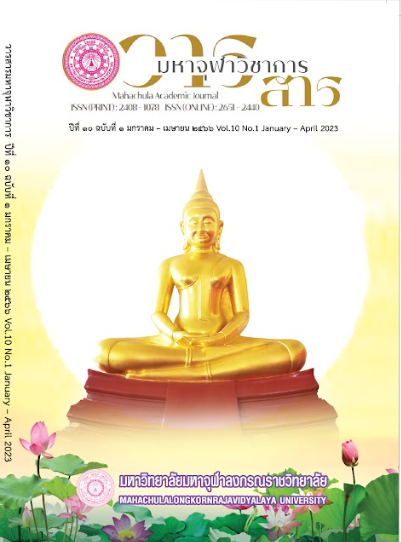A Study of The Factors of Alternative Schools Administration Based on Montessori Principle in Thailand
Main Article Content
Abstract
The research aimed to determine: (1) study the factors of alternative schools administration based on Montessori principle in Thailand (2) confirm the factors of alternative schools administration based on Montessori principle in Thailand. The population of this research were 195 schools. The sample size consisted of 130 schools, which was determined by the Krejcie and Mongan’s comparison table of the Size. The were 5 respondents from each school which included (1) school director (2) deputy director, academic affairs (3) head of academic affairs and (4) teacher, with a total of 650 respondents. The instruments for collecting the data were semi-structured interview, opinionnaire and confirmative form. The statistics used in this study were frequency, percentage, arithmetic mean, standard deviation, exploratory factor analysis
The finding of this study were as follow: 1) The factors of alternative schools administration based on Montessori principle in Thailand consists of 6 elements: (1) The Montessori Mission (2) Policy, Resource Management, School Curriculum (3) Organizing the Learning Environment (4) A Build of morale (5) Integration, Measurement and Evaluation (6) The Arrangement of Facilities. 2) The results of confirmation of the factors of alternative schools administration based on Montessori principle in Thailand consists are accurate, appropriate, feasible and applicable.
Article Details

This work is licensed under a Creative Commons Attribution-NonCommercial-NoDerivatives 4.0 International License.
References
กรรณิการ์ บัทท์. “การพัฒนาตัวบ่งชี้สำหรับโครงการบริหารจัดการมอนเตสซอรีในโรงเรียนไทย”. วารสารมหาวิทยาลัยบูรพา. ปีที่ ๑๒ ฉบับที่ ๑ (มกราคม-มิถุนายน ๒๕๖๑) : ๖๑-๖๘.
แผนการปฏิรูปประเทศด้านการศึกษา แผนการปฏิรูปประเทศฉบับปรับปรุง. ราชกิจจานุเบกษา. เล่ม ๑๓๘ ตอนพิเศษ ๔๔ ง, ๒๕๖๔.
พระราชบัญญัติการศึกษาแห่งชาติ พ.ศ. ๒๕๔๒ แก้ไขเพิ่มเติม (ฉบับที่ ๒) พ.ศ.๒๕๔๕ และ (ฉบับที่ ๓) พ.ศ. ๒๕๕๓. ราชกิจจานุเบกษา. เล่ม ๑๑๖. ตอนที่ ๗๔ ก (๑๙ สิงหาคม ๒๕๔๒).
ฟุจิซากิ ทัตซึฮิโระ. บ้านมอนเตสซอรีสำหรับเด็กวัย ๓-๖ ขวบ. กรุงเทพมหานคร: แซนด์คล็อคบุ๊คส์, ๒๕๖๔.
รัฐธรรมนูญแห่งราชอาณาจักรไทย ๒๕๖๑. ราชกิจจานุเบกษา. เล่ม ๑๓๔ ตอนที่ ๔๐ ก. ๒๕๖๐.
สำนักบริหารงานการศึกษาภาคบังคับ สำนักงานคณะกรรมการการศึกษาขั้นพื้นฐาน กระทรวงศึกษาธิการ. คู่มือการจัดประสบการณ์ระดับปฐมวัยตามแนวคิดมอนเตสซอรี ในบริบท สพฐ. เล่ม ๑ รู้และเข้าใจมอนเตสซอรี : ทฤษฎีสู่การปฏิบัติ. กรุงเทพมหานคร: โรงพิมพ์ชุมนุมสหกรณ์การเกษตร แห่งประเทศไทย จำกัด, ๒๕๕๘.
สำนักบริหารงานการศึกษาภาคบังคับ สำนักงานคณะกรรมการการศึกษาขั้นพื้นฐาน กระทรวงศึกษาธิการ. คู่มือดำเนินงานการพัฒนาครูและบุคลากรทางการศึกษา โครงการส่งเสริมการจัดประสบการณ์ระดับปฐมวัย ตามแนวคิดมอนเตสซอรี ในบริบท สพฐ. กรุงเทพมหานคร: โรงพิมพ์ชุมนุมสหกรณ์การเกษตรแห่งประเทศไทย จำกัด, ๒๕๕๘.
สำนักบริหารงานการศึกษาภาคบังคับ สำนักงานคณะกรรมการการศึกษาขั้นพื้นฐาน กระทรวงศึกษาธิการ. เอกสารประกอบการอบรมโครงการพัฒนาคุณภาพโรงเรียนสู่มาตรฐาน การจัดการเรียนรู้ที่สอดคล้องกับพัฒนาการทางสมอง (Brian-based Learning: BBL) กิจกรรมการจัดประสบการณ์ ตามแนวคิดมอนเตสซอรี ระดับปฐมวัย. กรุงเทพมหานคร: โรงพิมพ์ชุมนุมสหกรณ์การเกษตรแห่งประเทศไทย จำกัด, ๒๕๕๘.
Mak J Gwendolyn. “Characteristics of Modern Montessori”. The Degree of Master of Science Educational Psychology at George Mason University of Virginia. United States, 2014.
Starling Denise DaMesia. “Fidelity of Implementation of an Urban Elementary Montessori Kindergarten Program”. Dissertation for the Doctor degree to Walden University. United States, 2018.
Association Montessori Internationale : AMI. The Montessori Difference. [Online]. Available: https://montessori--ami-org.translate.goog/aboutmontessori?_x_tr_sl=en&_x_tr_tl =th&_x_tr_hl=th&_x_tr_pto=sc [20 September 2021].
Montessori Northwest. What is Montessori Education?, [Online], Available: https://montessori-nw.org/about-montessori-education/#whyteachmontessori [20 September 2021].


